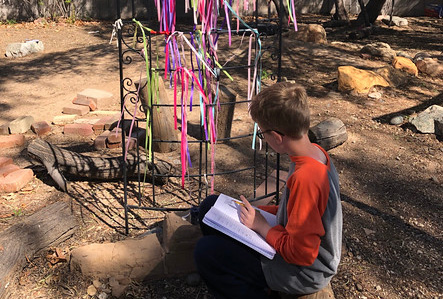Our new edition of The Harvest, the Seed’s yearbook, just arrived this week. It’s full of happy student faces, quotes, and photos of their lively art collected from projects throughout the year. Usually we dedicate the yearbook to a staff member. This year, at the request of Krina (our editor), the dedication is different. It reads: “Dedicated to all students: those who are here and those who are not, inseparably rooted forever at the Seed.” I love this dedication for many reasons, particularly the part about being “inseparably rooted forever at the Seed.” I think about this, especially around graduation time when news of our graduates is widespread. I hope their years at the Seed have served them well and contributed to their successes in life.
My thoughts about success shifted this week after listening to an On Being podcast between host Krista Tippett and two remarkable educators, Denise Pope and Abraham Verghese. Pope is a senior lecturer in the graduate school of education at Stanford. She is the author of Doing School: How We Are Creating a Generation of Stressed-Out, Materialistic, and Miseducated Students and is part of Stanford’s Resilience Project that helps students learn that “setbacks…are a normal part of a rigorous education.” In addition to being a physician and author, Verghese is a CASBS (Center for Advanced Study in Behavioral Sciences) faculty fellow, and “launched the Stanford Presence Center to focus on the human connection in medicine.”
The focus of their conversation was on a current view of success that equates it with making money, getting good grades, and getting into prestigious colleges at the expense of students’ well being. In Krista Tippett’s words: “I think one of the most ironic costs of this manic drive to success that we’ve created is that there’s a fearfulness that comes with it, a fear of taking the wrong step, of asking the wrong question, of sounding stupid.” They talked about the importance of relationship in a truly meaningful educational experience. Pope had this to say: “There’s definitely a corollary in education around relationships, because we know that when you feel that there’s someone who has your back, when there’s an adult you can go to if you have a problem, if your teacher truly cares about you, knows your name, knows who you are, knows how you learn, kids are more engaged. They do better….We know how to get kids to learn. We know that if you feel safe, and you feel like you belong, and you’re excited and engaged, you’re more likely going to learn than if you’re not.”
Verghese spoke about changes needed in both medicine and education. He enthusiastically described the path of several of his medical students getting their MDs as well as MBAs. “They did that because they want to change medicine. They want to reform this thing. And they know they need a knowledge of finance. One of them, I just learned, has dropped out because he’s running for office in Colorado. That is the kind of change, I think, our generation needs to encourage.”
This conversation seemed highly relevant to the work we’re doing at the Seed. We encourage students to follow their interests, love learning for the sake of learning, and recognize that their teachers have their backs. We help them practice using their voices in social interactions and classroom dialogues, which will undoubtedly have an impact on their future selves. Just this week, the mother of a five-year-old told us how passionate her son is to change the world for ocean creatures after months of ocean study with his class. I am hopeful our Seed students will experience success in their future lives, not based on pressure to make a certain amount of money or choose a profession to please someone else, but because they have followed the calling that tugs at their heart.

